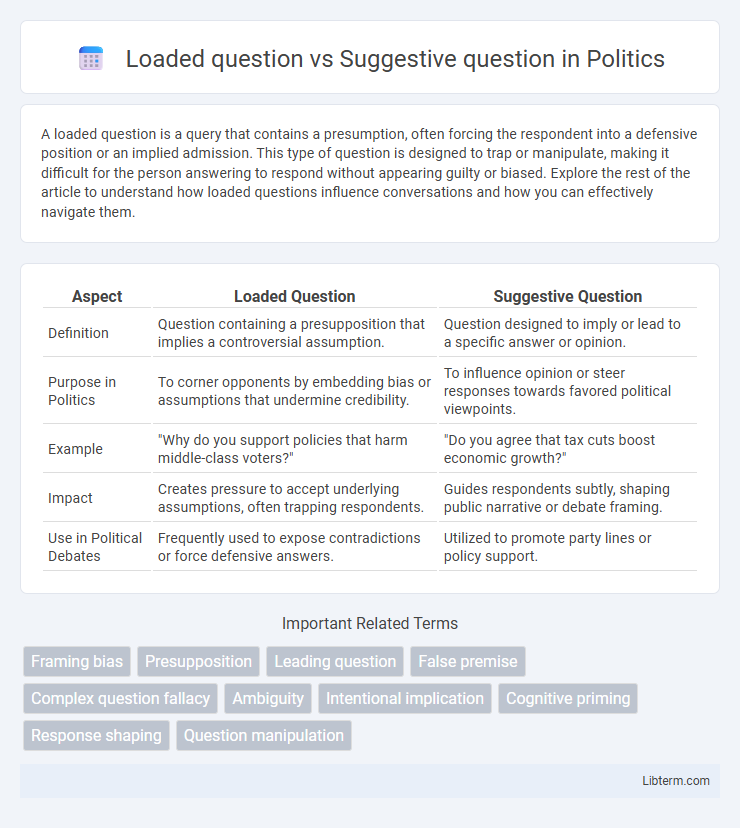A loaded question is a query that contains a presumption, often forcing the respondent into a defensive position or an implied admission. This type of question is designed to trap or manipulate, making it difficult for the person answering to respond without appearing guilty or biased. Explore the rest of the article to understand how loaded questions influence conversations and how you can effectively navigate them.
Table of Comparison
| Aspect | Loaded Question | Suggestive Question |
|---|---|---|
| Definition | Question containing a presupposition that implies a controversial assumption. | Question designed to imply or lead to a specific answer or opinion. |
| Purpose in Politics | To corner opponents by embedding bias or assumptions that undermine credibility. | To influence opinion or steer responses towards favored political viewpoints. |
| Example | "Why do you support policies that harm middle-class voters?" | "Do you agree that tax cuts boost economic growth?" |
| Impact | Creates pressure to accept underlying assumptions, often trapping respondents. | Guides respondents subtly, shaping public narrative or debate framing. |
| Use in Political Debates | Frequently used to expose contradictions or force defensive answers. | Utilized to promote party lines or policy support. |
Introduction to Loaded and Suggestive Questions
Loaded questions contain implicit assumptions that force a specific answer, often trapping the respondent in a dilemma, while suggestive questions guide the respondent toward a particular response by implying one is preferred or correct. Both question types impact the objectivity of responses by influencing how information is perceived and answered, affecting data validity in surveys, interviews, and legal interrogations. Understanding their distinct roles helps in designing unbiased questionnaires and fostering clearer communication.
Definition of a Loaded Question
A loaded question is a type of inquiry that contains an implicit assumption, forcing the respondent to accept a presupposition embedded within the question itself. This form of question is designed to limit direct answers by embedding controversial or unjustified assumptions, often leading to a trap for the respondent. In contrast, a suggestive question subtly influences the answer by implying a desired response without embedding a presupposition.
Definition of a Suggestive Question
A suggestive question is designed to lead the respondent toward a specific answer by implying or assuming certain facts within the question itself. Unlike a loaded question, which contains an unjustified assumption that traps the respondent, a suggestive question subtly influences the answer by framing the context or wording to evoke a desired response. Suggestive questions often appear in surveys and interviews to guide opinions without direct statements.
Key Differences Between Loaded and Suggestive Questions
Loaded questions contain presuppositions that force respondents into admitting something implicitly, often trapping them in a no-win scenario, whereas suggestive questions imply a desired answer or guide respondents toward a specific response without explicit facts. Loaded questions often employ emotionally charged or assumptive phrasing that can skew truthfulness and fairness in responses. Suggestive questions typically influence opinion subtly by introducing bias through wording or tone without directly embedding assumptions.
Common Examples of Loaded Questions
Loaded questions often imply a presumption that traps the respondent, such as "Have you stopped wasting company resources?" which presupposes previous misuse. Suggestive questions guide the respondent toward a desired answer, for example, "Don't you agree that this policy benefits everyone?" Loaded questions frequently appear in legal interrogations or debates, where implications can unfairly influence responses.
Common Examples of Suggestive Questions
Suggestive questions often imply an expected answer or lead the respondent toward a particular response, such as "Don't you think this product is the best on the market?" or "Wouldn't you agree that our service is superior to competitors?" These questions are commonly used in marketing surveys and legal examinations to influence opinions or testimonies. Loaded questions differ by containing a presupposition, like "Have you stopped wasting time on ineffective strategies?" which assumes prior behavior.
Psychological Impact on Respondents
Loaded questions often create psychological pressure by embedding assumptions that can lead to feelings of guilt or defensiveness, influencing respondents to answer in ways that may not reflect their true opinions. Suggestive questions subtly guide respondents toward a particular response, potentially biasing their answers by framing options or implications favorably. Both types can compromise the authenticity of data by manipulating emotional states and cognitive processes during the response phase.
How to Identify Loaded and Suggestive Questions
Identify loaded questions by detecting implicit assumptions that pressure the respondent to accept a premise, often containing emotionally charged or biased language. Suggestive questions can be recognized by phrasing that guides or influences the respondent toward a particular answer, frequently through leading words or tone. Analyzing question structure for embedded judgments or cues helps differentiate between loaded and suggestive questions effectively.
Consequences in Surveys and Research
Loaded questions introduce bias by embedding assumptions that can distort survey responses, leading to invalid or misleading data that compromise the integrity of research conclusions. Suggestive questions steer participants toward a particular answer, which can result in response bias, reducing the reliability and generalizability of findings. Both question types undermine data quality, negatively impacting decision-making processes and the validity of policy or scientific recommendations based on survey results.
Best Practices to Avoid Bias in Question Framing
Loaded questions embed assumptions that bias responses, while suggestive questions imply a preferred answer, both leading to skewed data. Best practices to avoid bias include using neutral language, separating multiple concepts into distinct questions, and pre-testing surveys for clarity and impartiality. Employing open-ended questions can also minimize respondent influence and enhance data accuracy.
Loaded question Infographic

 libterm.com
libterm.com